Talk to a Registered Dietitian and use INSIDER20 for 20% off!
Talk to a real Dietitian for only $99: Schedule Now
This post contains links through which we may earn a small commission should you make a purchase from a brand. This in no way affects our ability to objectively critique the products and brands we review.
Evidence Based Research To fulfill our commitment to bringing our audience accurate and insightful content, our expert writers and medical reviewers rely on carefully curated research.
Read Our Editorial Policy
If you found this article because you were frantically searching for what to eat to relieve a bout of diarrhea—first off, we’re sorry for your current condition!
Whether it was caused by food poisoning, drinking contaminated water, food intolerances, the stomach flu, or digestive disorders like IBS (irritable bowel syndrome), diarrhea is no fun for anyone.
Although sometimes the last thing you want to do when you have diarrhea is to eat more (no sense in adding fuel to the fire, right?), certain foods can help to settle your digestive system and slow things down.
Conversely, there are many more foods to avoid in this situation, as they can make diarrhea worse or prolong your symptoms.
Let’s take a look at the foods to eat when you have diarrhea, which to avoid, and supplements for diarrhea so you can go back to living your life without maintaining the knowledge of every closest bathroom.
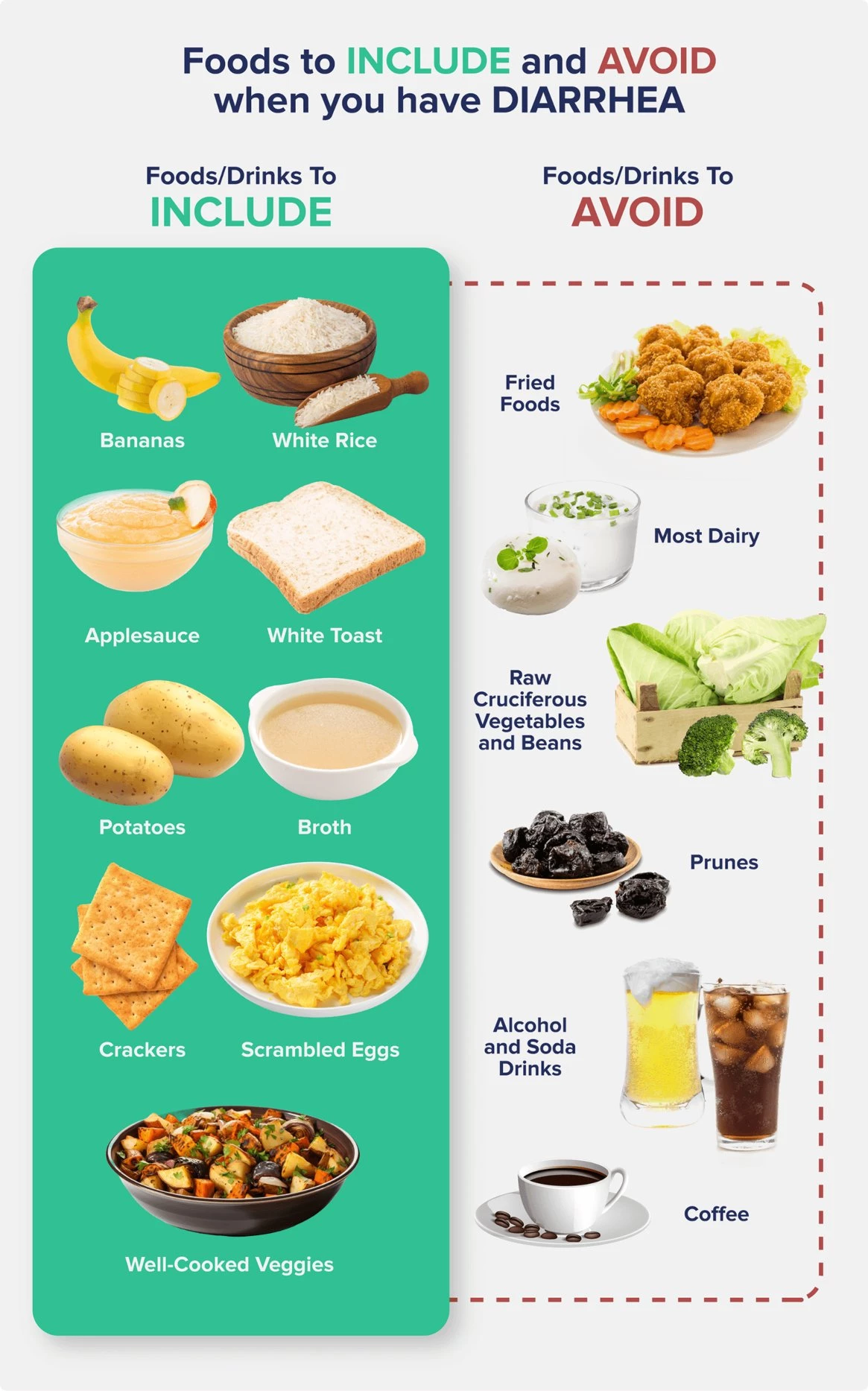
The first four foods on this list (bananas, rice, applesauce, and toast) make up the classic “diarrhea nutrition plan” called the BRAT diet.
Despite many families still adhering to this pattern of eating when diarrhea strikes, we should note that organizations like the American Academy of Pediatrics no longer use or recommend the use of the phrase “BRAT diet.”
While the four foods that make up BRAT are still on the right track when it comes to resolving diarrhea, doctors and pediatricians advise starting with those but adding in other bland foods as soon as tolerated to increase the nutritional value of your diet.
While you won’t want to be on the BRAT diet long-term—it’s devoid of protein, healthy fats, and many critical nutrients—eating these bland foods for a day or so can help relieve diarrhea symptoms when they’re at their worst.
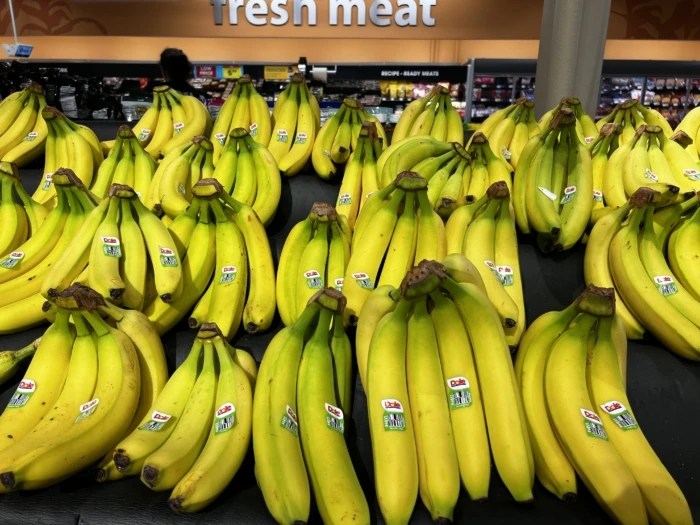
Whether you’re 4 or 40, one of the best foods to eat when you have diarrhea are bananas.
Bananas contain moderate amounts of fiber (about 3g per banana), most of which is soluble fiber—a type that is beneficial for diarrhea because it “soaks up” fluid in your intestines (gross, but true) to tighten up loose stools.
However, you don’t want to overdo it on fiber when you have diarrhea—too much and you may make your diarrhea worse—which is why high-fiber foods are not typically recommended to eat when you have diarrhea.
Additionally, you won’t want to eat foods high in insoluble fiber, which is better suited for treating constipation.
Bananas are also a great source of potassium—an electrolyte that is lost during bouts of diarrhea.
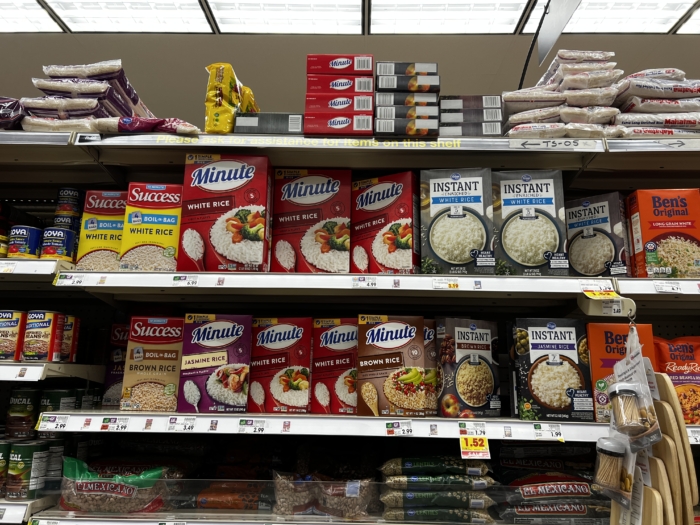
White rice is a bland, fiber-less carbohydrate that helps bind to loose stool, doesn’t take much energy to digest and absorb, and won’t cause an increase in bowel movements.
You’ll want to ensure that you don’t eat brown rice, which is full of fiber that will promote the bowels to move along—an action we don’t want when we have diarrhea.
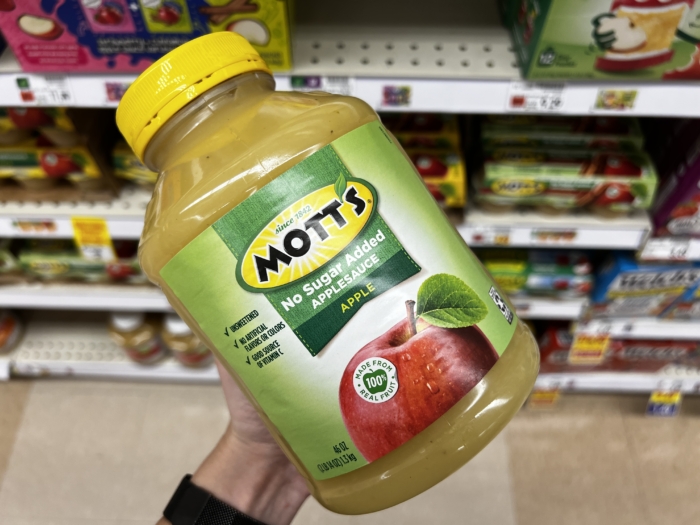
Like bananas, applesauce contains smaller amounts of dietary fiber that will help bind to loose stool without overwhelming the intestinal tract.
Applesauce also contains a compound called pectin—a type of soluble fiber that acts as a prebiotic in your digestive system to benefit your gut microbes.
Be sure to purchase unsweetened applesauce, as excess sugary foods are not beneficial for people with diarrhea.
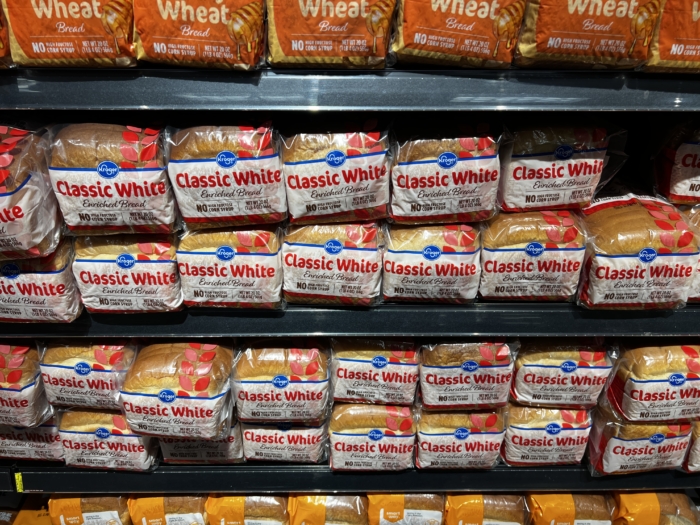
Again, the goal is low-fiber, starchy, bland foods that can help bind to the loose stool in your intestines and slow digestion.
Toast made out of white bread—no whole wheat or rye here—is easy to digest and likely will not irritate your sensitive digestive system.
As mentioned, you won’t want to follow the BRAT diet for a long time—one to two days maximum before diversifying your diet with other foods on this list—as foods like white toast are generally not considered highly nutritious.
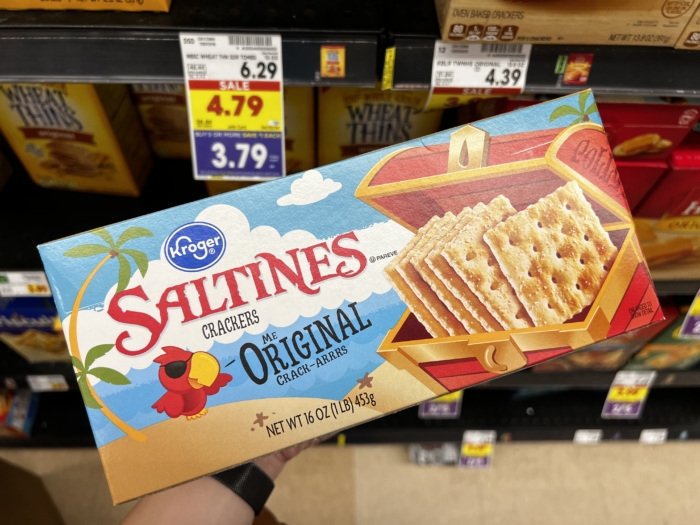
No matter the stomach ailment, saltines always seem to be the cracker of choice to soothe a troubled tummy.
Crackers like saltines or other bland, low-fiber options are easy on the stomach and typically contain salt, which can help restore some lost sodium from your bout of diarrhea.
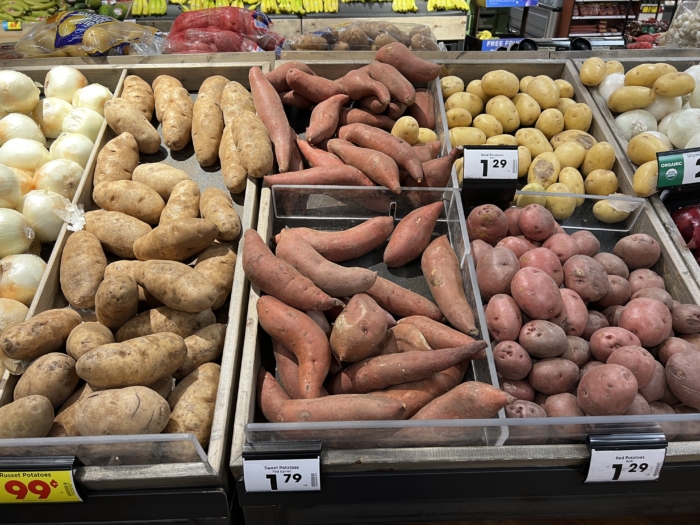
Boiled, baked, or mashed potatoes can be helpful for diarrhea—as long as you don’t add loads of butter or sour cream on top.
Potatoes are rich in starchy carbohydrates that can bind to loose stool, and they contain that sweet spot of fiber that we’re looking for to reduce diarrhea symptoms—about 4g per potato.
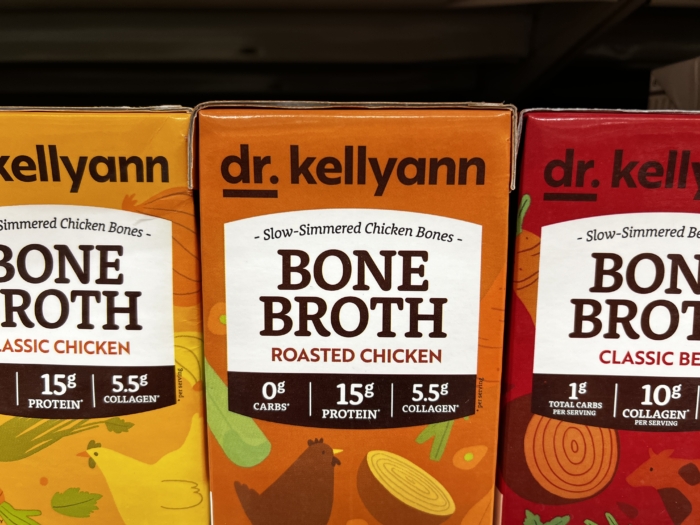
Broth can be a great addition to your daily beverage count, as it contains water and lots of sodium to replenish lost fluids and electrolytes.
We especially love making the switch from regular broth to bone broth, which adds in protein and important nutrients like glycine and collagen that can reduce inflammation in the gut and benefit intestinal health.
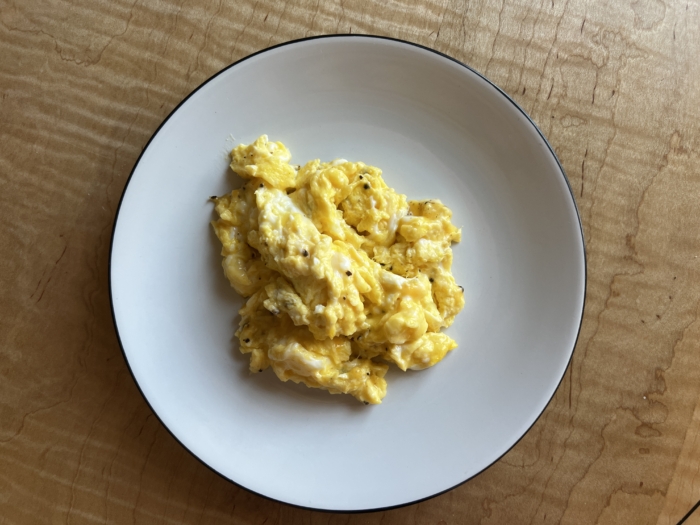
If you’re eating starchy carbs all day, you’re going to want to balance it out with some protein that is easy to digest, like scrambled eggs.
However, scrambled eggs are at the “second stage” of diarrhea recovery—your gut probably won’t be up for digesting them on day one or two of having severe diarrhea.
When you’re beginning to see the end in sight, add two to three plain scrambled eggs per day.
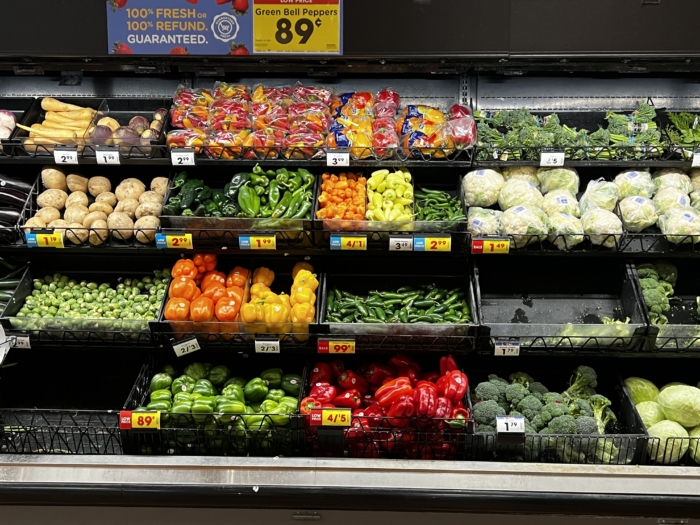
Similar to scrambled eggs, you can start adding in well-cooked veggies when you’re on the mend.
Vegetables like carrots, green beans, celery, and squash are good options—just be sure to cook them so well that they are almost mushy.
What you don’t eat when you have diarrhea is just as important as what you do eat, as you don’t want to aggravate or prolong your symptoms—like these top foods and beverages to avoid:
Some of the top natural herbal or supplemental treatments for diarrhea include:
Scrambled eggs can be beneficial for diarrhea, but typically not when it’s at its worst. Try eating scrambled eggs after you eat bland foods for a day or two.
Unfortunately, not much. Most typical toast toppings like jam or butter can further aggravate diarrhea symptoms. Many people add mashed bananas on top of toast, as bananas are one of the best foods to eat when you have persistent diarrhea.
Eating starchy carbohydrates that have moderate amounts of soluble fiber can help your stool to harden. These include bananas, plain cooked potatoes, white bread, white rice, and plain crackers.
Certain foods should be avoided when you have diarrhea, including:
• Fried foods
• Spicy foods
• Dairy products like butter, cheese, milk, and ice cream
• Raw cruciferous vegetables
• Beans
• Prunes
• Alcohol
• Coffee
• Fruit juice
• Soda
• Artificial sweeteners
• Sugar alcohols